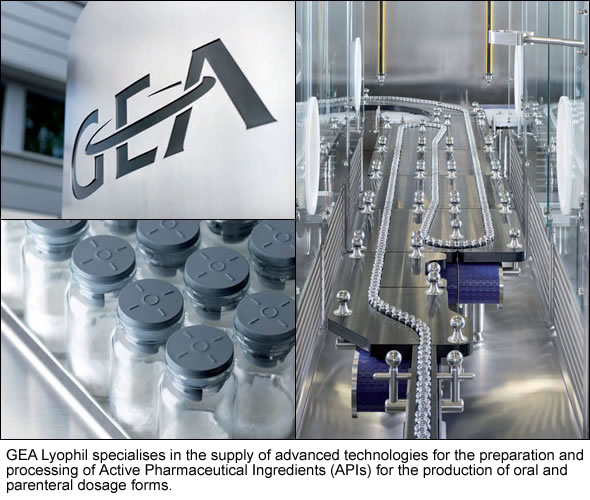EnWave Collaboration with GEA May Ensure Breakthrough in Pharma Industry
This week, EnWave Corporation (TSXV:ENW – $1.30 CAD & OTC:NWVCF – $1.04 USD & Frankfurt:E4U – €0.84) has signed a Collaboration and License Option Agreement with GEA Lyophil GmbH of Germany. The two companies will evaluate a potential partnership to manufacture and deploy continuous cGMP REV equipment into the global pharmaceutical sector.
GEA Lyophil, which is part of the GEA Group, has designed and manufactured freeze dryers for the pharmaceutical and biotech industries for more than half a century. With over 1,000 units installed worldwide, the company has established a solid base of expertise related to the needs of the pharmaceutical and biotech industries. The organisation has manufacturing and technology centres in Belgium, Denmark, Germany, Switzerland, the UK, Singapore and the United States.
The goal is for GEA to evaluate EnWave’s continuous pilot-scale REV machine for the pharmaceutical industry, which is produced for Merck and located at the Company’s facility in B.C., Canada.
CGMP refers to the Current Good Manufacturing Practice regulations enforced by the U.S. Food & Drug Administration (FDA). CGMPs provide for systems that assure proper design, monitoring, and control of manufacturing processes and facilities. Adherence to the CGMP regulations assures the identity, strength, quality, and purity of drug products by requiring that manufacturers of medications adequately control manufacturing operations. The “C” in CGMP stands for “current”, which requires companies to use technologies and systems that are up-to-date in order to comply with the regulations.
Remember that EnWave and Merck have signed an R&D agreement to develop a REV machine that could potentially replace part of Merck’s existing freeze drying equipment. The REV equipment for Merck is designed to provide high-speed dehydration for live and active organisms in vials with the potential for significantly lowering operating costs compared with freeze drying.
Unlike freeze drying, also referred to as lyophilization, REV employs a combination of microwave energy with a low-pressure environment to achieve rapid, highly controlled dehydration of live, or active, biological materials. Tests conducted on a lab-scale REV show that processing times are far less than with lyophilization, which dramatically reduces costs. In addition, the footprint of a REV machine is sizably smaller than a lyophilizer. And finally, third party tests show no key differences between REV and lyophilized products.
We understand that test results with a scaled-up REV machine for Merck have been very encouraging. EnWave is now looking to finalize the CGMP certification of this machine, which would trigger the next stages of Merck’s project.

Strong Win-Win Potential
The Agreement between EnWave and GEA grants the latter an exclusive option to negotiate an agreement to manufacture and sell equipment for the production of pharmaceutical and biotechnology products using EnWave’s patented dehydration technology.
Such a deal could be significantly beneficial for both parties. GEA is a well-established company that has the expertise, the personnel and the contacts in the pharmaceutical industry to boost REV sales. That would also save EnWave lots of headaches as it wouldn’t have to build out massive infrastructure with lots of overhead costs, while it would still reap the rewards of owning the REV technology.
As for GEA, it could gain control over a disruptive technology in its core business. It would be a wise decision of GEA to collaborate with EnWave before its REV technology really takes off in the pharmaceutical industry. Moreover, if it works for the pharma sector, GEA could be a strong partner in de food sector as well.
After all, GEA Group is one of the largest suppliers of process technology for the food industry and a wide range of other industries. In 2017, GEA Group generated consolidated revenues of about EUR 4.6 billion. The food and beverages sector, which is a long-term growth industry, accounted for around 70 percent.
Conclusion
A partnership between GEA and EnWave could significantly accelerate the commercialization of EnWave’s REV technology in the pharmaceutical markets. By pairing EnWave’s patented vacuum drying technology with GEA’s industry leading manufacturing practices and market reach, it could become a true worldwide success.
During the next few months, GEA will work with EnWave’s experienced engineering and biomaterials team to conduct tests using REV pharmaceutical lyophilization equipment. GEA will evaluate the commercial viability of a partnership and the potential integration of EnWave’s technology into processing solutions for pharmaceutical applications. Recommendation: BUY.
| For important disclosures, please read our disclaimer. | Latest Company Report (pdf) | |

Smallcaps is the best website to follow up Enwave 🙂 !
Do you think the GEA-deal will lead to a buyout of Enwave when the outcome is satisfying for them?
Hi Els,
Thank you very much for your kind words. We really appreciate it and will continue to do our best to cover EnWave as good as possible.
That is actually a very good and legitimate question. If the evaluation is satisfying for GEA and they see potential to use REV on a wide scale in the pharma and potentially even the food sectors then a buyout is certainly a possibility. After all, the parent company called GEA Group has annual revenues of $4.6 billion EUR, so it’s certainly big enough to acquire a company like EnWave.
If it were to come to a buyout, I would be disappointed if we only get $3 of $4 dollars per share though. You only come across a company like EnWave every so often.
Cheers,
John